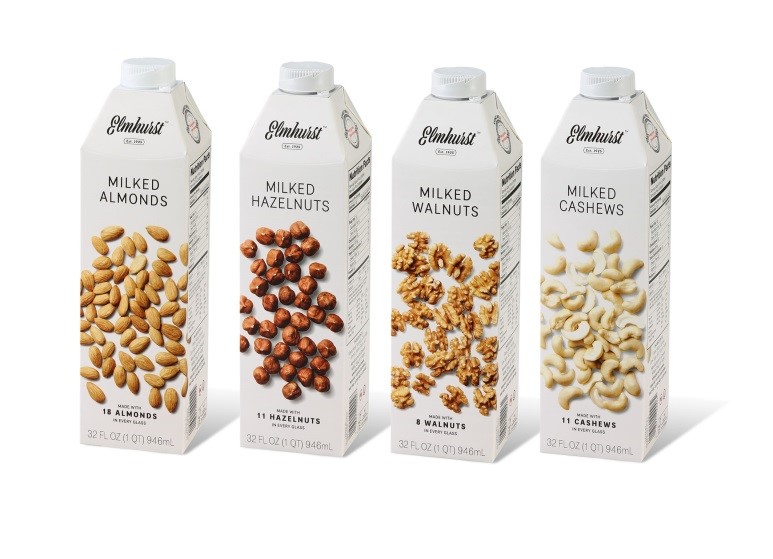A prominent dairy becomes a rising player in the plant-milk category.

After 80 years of operation, in 2016 Elmhurst CEO Henry Schwartz shuttered his family’s processing plant in New York City. A prominent mainstay in Jamaica, Queens, the plant employed 273 people and supplied milk to schools across New York City’s five boroughs. But last year Schwartz told The New York Times that the business of processing milk at the plant was simply not profitable anymore.
Rather than ditch a company founded by his relatives in 1919, Schwartz pivoted his business to reflect the rapidly shifting way in which consumers are buying milk: choosing milks made not from cows but from plants.
Now called Elmhurst Milked, the family business continues on by making delicious, additive-free nut milks produced with five pronounceable ingredients: filtered water, nuts (almonds, cashews, walnuts or hazelnuts), cane sugar, salt and natural flavors. The result is a creamy milk that contains 3 to 5 grams of protein per serving. Here, we chat with Schwartz to learn why—and how—he decided to transition his traditional dairy into a rising provider of plant-based, vegan milks.
What sparked the decision to transition Elmhurst from a cow’s milk company to a nut-based milk company?
Henry Schwartz: I made the decision to transition from dairy to plant-based beverages after experiencing what a difference plant-based beverages made in my own diet. After familiarizing myself with plant-based milks and the existing nut milk market, I wanted to prove that plant-based milks could be just as nutritious and flavorful as the highest quality dairy milk. I have great faith in the future of plant-based foods, and I believe the plant-based beverage industry has enormous potential both on a business level and in terms of delivering consistent, high-quality nutrition to consumers in a sustainable and innovative manner.
I can imagine that loyal customers of Elmhurst Dairy were not particularly thrilled about the transition to plant milks. How did you communicate with your core customers (individuals and larger clients) when making the switch?
HS: We’re happy to report that the response has been overwhelmingly positive both from new and long-term customers. We have seen many former Elmhurst Dairy customers embrace our new Elmhurst Milked nut milks, as they trust our brand name and recognize that we are still delivering a safe, nutritious, delicious product that happens to be made from plants instead of dairy.
Has there been a learning curve in manufacturing plant-based milks versus cow’s milk? What has been the most surprising aspect of the nut milk business?
HS: There has not been a significant learning curve, largely because I prioritized recruiting top talent like Dr. Cheryl Mitchell to help me launch the Elmhurst Milked line of nut milks. Dr. Mitchell has devoted her career as a lifelong innovator in the vegan food space to finding a way to extract nutrition from nuts, grains and seeds in a manner that delivers a delicious, appealing product to consumers without damaging the plants’ inherent nutritional value. She and the rest of the new Elmhurst Milked team have helped to make Elmhurst’s transition from dairy to nut milk rather seamless.
Plus, at the end of the day, whether dealing in dairy milk or nut milk, it’s all about delivering a consistent, nutritious product that consumers will trust and enjoy. In that sense, nothing about my work has changed.
Unlike many plant-based milks, Elmhurst doesn't use any gums or thickeners in their products. What drove this decision?
HS: First, we think nature has done a pretty great job at crafting delicious, nutritious plant-based foods already! Second, our patented cold milling technology enables us to extract the full nutrient content of each nut in a creamy, protein-rich, all-natural emulsion that has a full flavor and naturally smooth texture—no emulsifiers, gums or thickeners needed.
What seems to be most notable about Elmhurst’s switch to nut milks is that you recognized plant-based foods are not a fad—they represent a systemic shift in the way Americans eat. In your opinion, why are plant-based products rising in popularity, and how will this category continue to thrive?
HS: I believe plant-based products are rising in popularity in tandem with increasing consumer demand for clean label products and transparency surrounding manufacturing practices, sourcing practices and nutritional content. Consumers are more informed than ever before, and they care more than ever before about the environmental, ethical and health implications of the products they purchase and consume, and increasingly opt for plant-based products. I believe the category will certainly continue to thrive and has immense potential as plant-based companies like Elmhurst Milked continues to innovate and find new ways to deliver high quality plant-based nutrition to consumers.
About the Author(s)
You May Also Like




